Entrepreneurship: Small Business Ventures and Economic Impact
VerifiedAdded on 2023/01/09
|15
|4253
|80
Report
AI Summary
This report provides a comprehensive analysis of entrepreneurship and small business management, focusing on various entrepreneurial ventures and their typologies. It examines the similarities and differences between these ventures and interprets data and statistics to understand their impact on the UK economy. The report highlights the importance of small businesses and start-ups in the growth of the social economy, detailing how they contribute to job creation, innovation, and overall economic development. Furthermore, it identifies the key characteristics, skills, and traits of successful entrepreneurs, differentiating them from business managers, and explores how background and experience can either hinder or foster entrepreneurial success. The report emphasizes the role of entrepreneurship in promoting economic growth and social welfare, making it a valuable resource for understanding the dynamics of small business management and its broader implications.

Entrepreneurship and
small business
management
small business
management
Paraphrase This Document
Need a fresh take? Get an instant paraphrase of this document with our AI Paraphraser
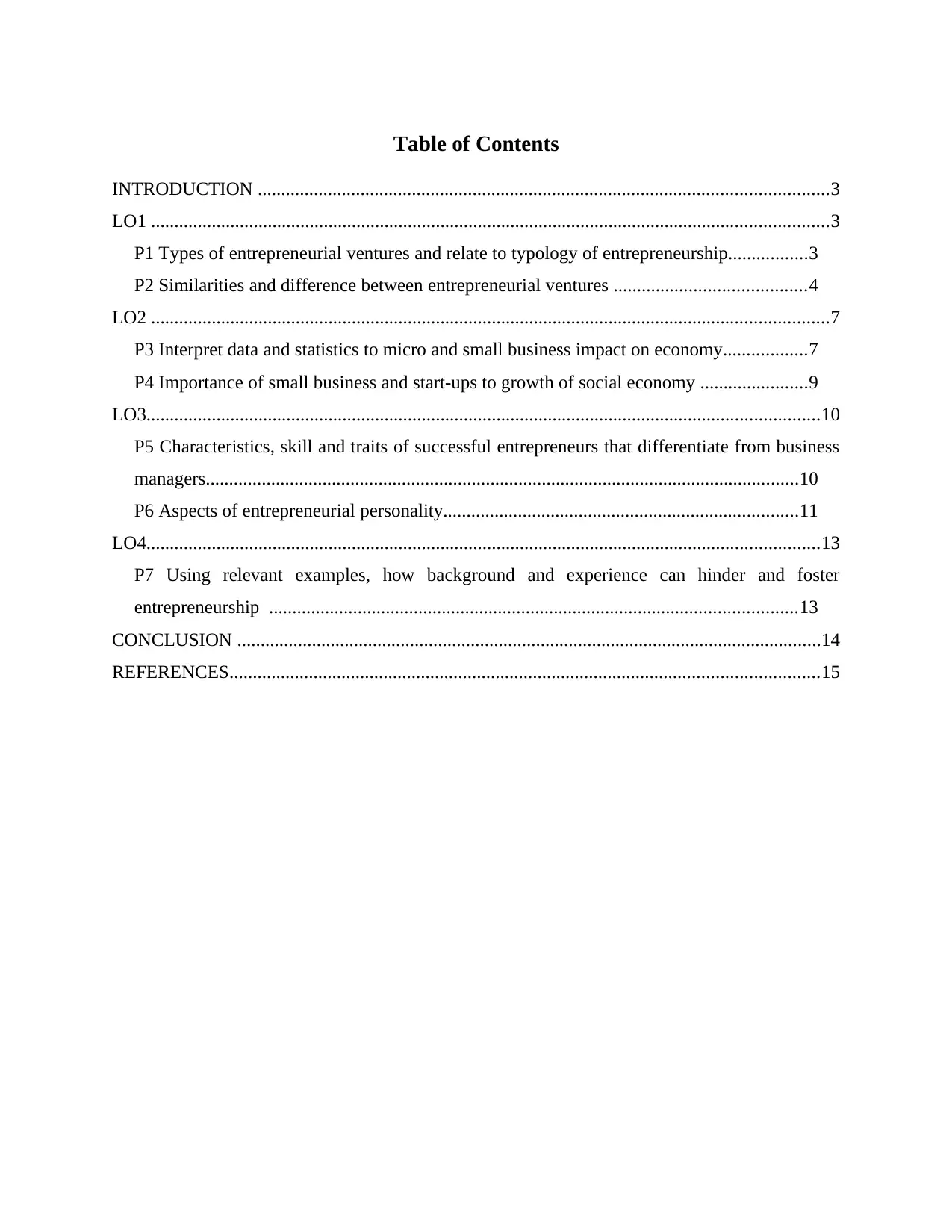
Table of Contents
INTRODUCTION ..........................................................................................................................3
LO1 .................................................................................................................................................3
P1 Types of entrepreneurial ventures and relate to typology of entrepreneurship.................3
P2 Similarities and difference between entrepreneurial ventures .........................................4
LO2 .................................................................................................................................................7
P3 Interpret data and statistics to micro and small business impact on economy..................7
P4 Importance of small business and start-ups to growth of social economy .......................9
LO3................................................................................................................................................10
P5 Characteristics, skill and traits of successful entrepreneurs that differentiate from business
managers...............................................................................................................................10
P6 Aspects of entrepreneurial personality............................................................................11
LO4................................................................................................................................................13
P7 Using relevant examples, how background and experience can hinder and foster
entrepreneurship .................................................................................................................13
CONCLUSION .............................................................................................................................14
REFERENCES..............................................................................................................................15
INTRODUCTION ..........................................................................................................................3
LO1 .................................................................................................................................................3
P1 Types of entrepreneurial ventures and relate to typology of entrepreneurship.................3
P2 Similarities and difference between entrepreneurial ventures .........................................4
LO2 .................................................................................................................................................7
P3 Interpret data and statistics to micro and small business impact on economy..................7
P4 Importance of small business and start-ups to growth of social economy .......................9
LO3................................................................................................................................................10
P5 Characteristics, skill and traits of successful entrepreneurs that differentiate from business
managers...............................................................................................................................10
P6 Aspects of entrepreneurial personality............................................................................11
LO4................................................................................................................................................13
P7 Using relevant examples, how background and experience can hinder and foster
entrepreneurship .................................................................................................................13
CONCLUSION .............................................................................................................................14
REFERENCES..............................................................................................................................15
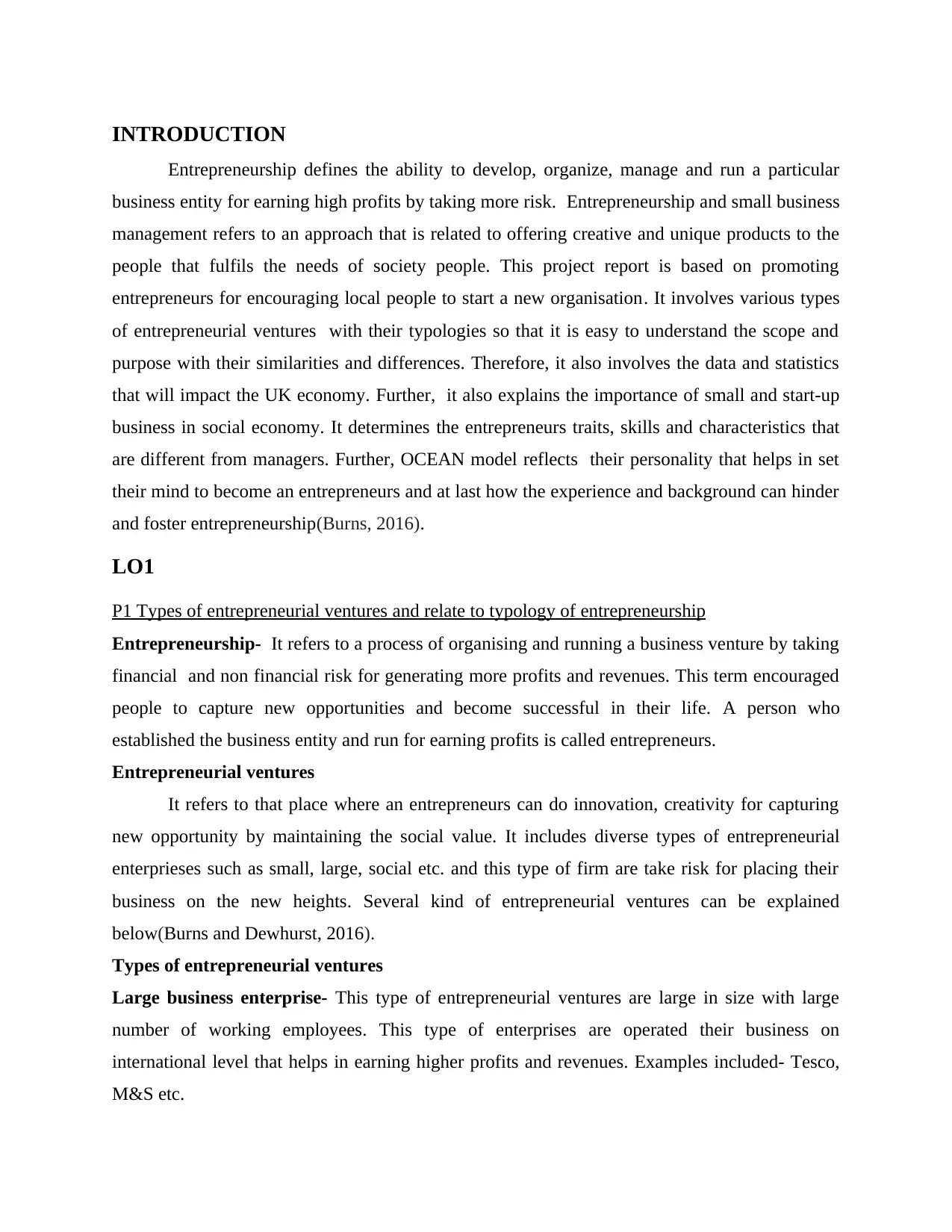
INTRODUCTION
Entrepreneurship defines the ability to develop, organize, manage and run a particular
business entity for earning high profits by taking more risk. Entrepreneurship and small business
management refers to an approach that is related to offering creative and unique products to the
people that fulfils the needs of society people. This project report is based on promoting
entrepreneurs for encouraging local people to start a new organisation. It involves various types
of entrepreneurial ventures with their typologies so that it is easy to understand the scope and
purpose with their similarities and differences. Therefore, it also involves the data and statistics
that will impact the UK economy. Further, it also explains the importance of small and start-up
business in social economy. It determines the entrepreneurs traits, skills and characteristics that
are different from managers. Further, OCEAN model reflects their personality that helps in set
their mind to become an entrepreneurs and at last how the experience and background can hinder
and foster entrepreneurship(Burns, 2016).
LO1
P1 Types of entrepreneurial ventures and relate to typology of entrepreneurship
Entrepreneurship- It refers to a process of organising and running a business venture by taking
financial and non financial risk for generating more profits and revenues. This term encouraged
people to capture new opportunities and become successful in their life. A person who
established the business entity and run for earning profits is called entrepreneurs.
Entrepreneurial ventures
It refers to that place where an entrepreneurs can do innovation, creativity for capturing
new opportunity by maintaining the social value. It includes diverse types of entrepreneurial
enterprieses such as small, large, social etc. and this type of firm are take risk for placing their
business on the new heights. Several kind of entrepreneurial ventures can be explained
below(Burns and Dewhurst, 2016).
Types of entrepreneurial ventures
Large business enterprise- This type of entrepreneurial ventures are large in size with large
number of working employees. This type of enterprises are operated their business on
international level that helps in earning higher profits and revenues. Examples included- Tesco,
M&S etc.
Entrepreneurship defines the ability to develop, organize, manage and run a particular
business entity for earning high profits by taking more risk. Entrepreneurship and small business
management refers to an approach that is related to offering creative and unique products to the
people that fulfils the needs of society people. This project report is based on promoting
entrepreneurs for encouraging local people to start a new organisation. It involves various types
of entrepreneurial ventures with their typologies so that it is easy to understand the scope and
purpose with their similarities and differences. Therefore, it also involves the data and statistics
that will impact the UK economy. Further, it also explains the importance of small and start-up
business in social economy. It determines the entrepreneurs traits, skills and characteristics that
are different from managers. Further, OCEAN model reflects their personality that helps in set
their mind to become an entrepreneurs and at last how the experience and background can hinder
and foster entrepreneurship(Burns, 2016).
LO1
P1 Types of entrepreneurial ventures and relate to typology of entrepreneurship
Entrepreneurship- It refers to a process of organising and running a business venture by taking
financial and non financial risk for generating more profits and revenues. This term encouraged
people to capture new opportunities and become successful in their life. A person who
established the business entity and run for earning profits is called entrepreneurs.
Entrepreneurial ventures
It refers to that place where an entrepreneurs can do innovation, creativity for capturing
new opportunity by maintaining the social value. It includes diverse types of entrepreneurial
enterprieses such as small, large, social etc. and this type of firm are take risk for placing their
business on the new heights. Several kind of entrepreneurial ventures can be explained
below(Burns and Dewhurst, 2016).
Types of entrepreneurial ventures
Large business enterprise- This type of entrepreneurial ventures are large in size with large
number of working employees. This type of enterprises are operated their business on
international level that helps in earning higher profits and revenues. Examples included- Tesco,
M&S etc.
⊘ This is a preview!⊘
Do you want full access?
Subscribe today to unlock all pages.

Trusted by 1+ million students worldwide
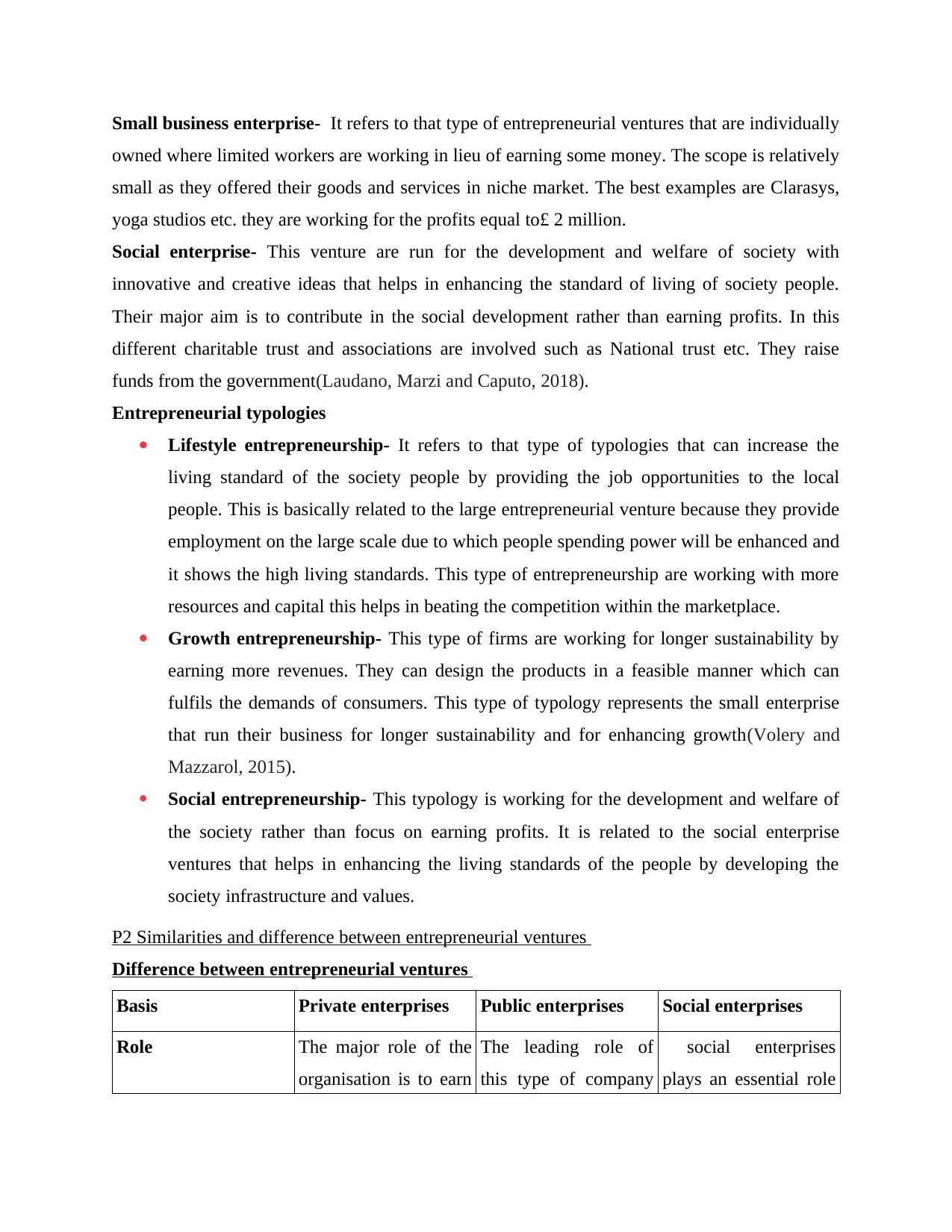
Small business enterprise- It refers to that type of entrepreneurial ventures that are individually
owned where limited workers are working in lieu of earning some money. The scope is relatively
small as they offered their goods and services in niche market. The best examples are Clarasys,
yoga studios etc. they are working for the profits equal to£ 2 million.
Social enterprise- This venture are run for the development and welfare of society with
innovative and creative ideas that helps in enhancing the standard of living of society people.
Their major aim is to contribute in the social development rather than earning profits. In this
different charitable trust and associations are involved such as National trust etc. They raise
funds from the government(Laudano, Marzi and Caputo, 2018).
Entrepreneurial typologies
Lifestyle entrepreneurship- It refers to that type of typologies that can increase the
living standard of the society people by providing the job opportunities to the local
people. This is basically related to the large entrepreneurial venture because they provide
employment on the large scale due to which people spending power will be enhanced and
it shows the high living standards. This type of entrepreneurship are working with more
resources and capital this helps in beating the competition within the marketplace.
Growth entrepreneurship- This type of firms are working for longer sustainability by
earning more revenues. They can design the products in a feasible manner which can
fulfils the demands of consumers. This type of typology represents the small enterprise
that run their business for longer sustainability and for enhancing growth(Volery and
Mazzarol, 2015).
Social entrepreneurship- This typology is working for the development and welfare of
the society rather than focus on earning profits. It is related to the social enterprise
ventures that helps in enhancing the living standards of the people by developing the
society infrastructure and values.
P2 Similarities and difference between entrepreneurial ventures
Difference between entrepreneurial ventures
Basis Private enterprises Public enterprises Social enterprises
Role The major role of the
organisation is to earn
The leading role of
this type of company
social enterprises
plays an essential role
owned where limited workers are working in lieu of earning some money. The scope is relatively
small as they offered their goods and services in niche market. The best examples are Clarasys,
yoga studios etc. they are working for the profits equal to£ 2 million.
Social enterprise- This venture are run for the development and welfare of society with
innovative and creative ideas that helps in enhancing the standard of living of society people.
Their major aim is to contribute in the social development rather than earning profits. In this
different charitable trust and associations are involved such as National trust etc. They raise
funds from the government(Laudano, Marzi and Caputo, 2018).
Entrepreneurial typologies
Lifestyle entrepreneurship- It refers to that type of typologies that can increase the
living standard of the society people by providing the job opportunities to the local
people. This is basically related to the large entrepreneurial venture because they provide
employment on the large scale due to which people spending power will be enhanced and
it shows the high living standards. This type of entrepreneurship are working with more
resources and capital this helps in beating the competition within the marketplace.
Growth entrepreneurship- This type of firms are working for longer sustainability by
earning more revenues. They can design the products in a feasible manner which can
fulfils the demands of consumers. This type of typology represents the small enterprise
that run their business for longer sustainability and for enhancing growth(Volery and
Mazzarol, 2015).
Social entrepreneurship- This typology is working for the development and welfare of
the society rather than focus on earning profits. It is related to the social enterprise
ventures that helps in enhancing the living standards of the people by developing the
society infrastructure and values.
P2 Similarities and difference between entrepreneurial ventures
Difference between entrepreneurial ventures
Basis Private enterprises Public enterprises Social enterprises
Role The major role of the
organisation is to earn
The leading role of
this type of company
social enterprises
plays an essential role
Paraphrase This Document
Need a fresh take? Get an instant paraphrase of this document with our AI Paraphraser
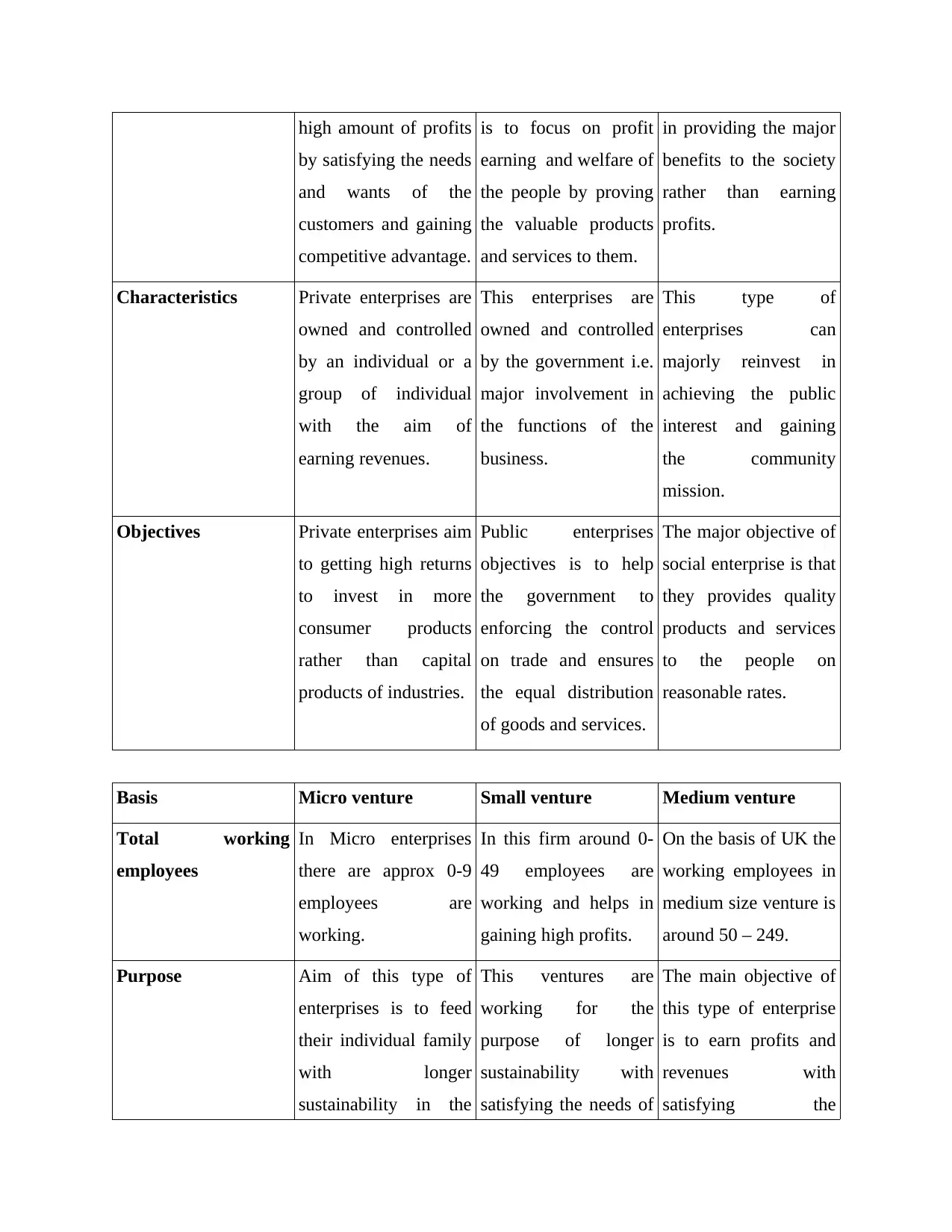
high amount of profits
by satisfying the needs
and wants of the
customers and gaining
competitive advantage.
is to focus on profit
earning and welfare of
the people by proving
the valuable products
and services to them.
in providing the major
benefits to the society
rather than earning
profits.
Characteristics Private enterprises are
owned and controlled
by an individual or a
group of individual
with the aim of
earning revenues.
This enterprises are
owned and controlled
by the government i.e.
major involvement in
the functions of the
business.
This type of
enterprises can
majorly reinvest in
achieving the public
interest and gaining
the community
mission.
Objectives Private enterprises aim
to getting high returns
to invest in more
consumer products
rather than capital
products of industries.
Public enterprises
objectives is to help
the government to
enforcing the control
on trade and ensures
the equal distribution
of goods and services.
The major objective of
social enterprise is that
they provides quality
products and services
to the people on
reasonable rates.
Basis Micro venture Small venture Medium venture
Total working
employees
In Micro enterprises
there are approx 0-9
employees are
working.
In this firm around 0-
49 employees are
working and helps in
gaining high profits.
On the basis of UK the
working employees in
medium size venture is
around 50 – 249.
Purpose Aim of this type of
enterprises is to feed
their individual family
with longer
sustainability in the
This ventures are
working for the
purpose of longer
sustainability with
satisfying the needs of
The main objective of
this type of enterprise
is to earn profits and
revenues with
satisfying the
by satisfying the needs
and wants of the
customers and gaining
competitive advantage.
is to focus on profit
earning and welfare of
the people by proving
the valuable products
and services to them.
in providing the major
benefits to the society
rather than earning
profits.
Characteristics Private enterprises are
owned and controlled
by an individual or a
group of individual
with the aim of
earning revenues.
This enterprises are
owned and controlled
by the government i.e.
major involvement in
the functions of the
business.
This type of
enterprises can
majorly reinvest in
achieving the public
interest and gaining
the community
mission.
Objectives Private enterprises aim
to getting high returns
to invest in more
consumer products
rather than capital
products of industries.
Public enterprises
objectives is to help
the government to
enforcing the control
on trade and ensures
the equal distribution
of goods and services.
The major objective of
social enterprise is that
they provides quality
products and services
to the people on
reasonable rates.
Basis Micro venture Small venture Medium venture
Total working
employees
In Micro enterprises
there are approx 0-9
employees are
working.
In this firm around 0-
49 employees are
working and helps in
gaining high profits.
On the basis of UK the
working employees in
medium size venture is
around 50 – 249.
Purpose Aim of this type of
enterprises is to feed
their individual family
with longer
sustainability in the
This ventures are
working for the
purpose of longer
sustainability with
satisfying the needs of
The main objective of
this type of enterprise
is to earn profits and
revenues with
satisfying the
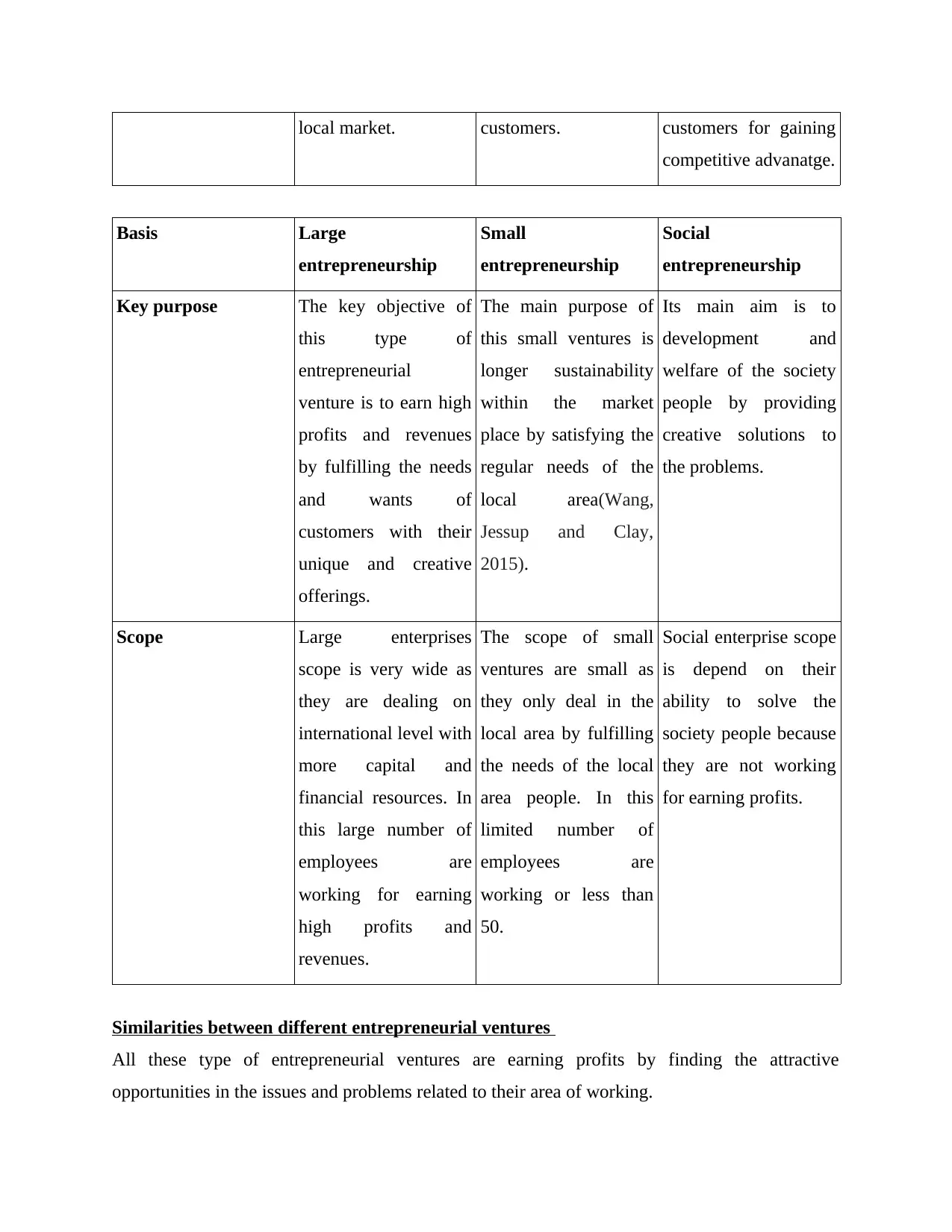
local market. customers. customers for gaining
competitive advanatge.
Basis Large
entrepreneurship
Small
entrepreneurship
Social
entrepreneurship
Key purpose The key objective of
this type of
entrepreneurial
venture is to earn high
profits and revenues
by fulfilling the needs
and wants of
customers with their
unique and creative
offerings.
The main purpose of
this small ventures is
longer sustainability
within the market
place by satisfying the
regular needs of the
local area(Wang,
Jessup and Clay,
2015).
Its main aim is to
development and
welfare of the society
people by providing
creative solutions to
the problems.
Scope Large enterprises
scope is very wide as
they are dealing on
international level with
more capital and
financial resources. In
this large number of
employees are
working for earning
high profits and
revenues.
The scope of small
ventures are small as
they only deal in the
local area by fulfilling
the needs of the local
area people. In this
limited number of
employees are
working or less than
50.
Social enterprise scope
is depend on their
ability to solve the
society people because
they are not working
for earning profits.
Similarities between different entrepreneurial ventures
All these type of entrepreneurial ventures are earning profits by finding the attractive
opportunities in the issues and problems related to their area of working.
competitive advanatge.
Basis Large
entrepreneurship
Small
entrepreneurship
Social
entrepreneurship
Key purpose The key objective of
this type of
entrepreneurial
venture is to earn high
profits and revenues
by fulfilling the needs
and wants of
customers with their
unique and creative
offerings.
The main purpose of
this small ventures is
longer sustainability
within the market
place by satisfying the
regular needs of the
local area(Wang,
Jessup and Clay,
2015).
Its main aim is to
development and
welfare of the society
people by providing
creative solutions to
the problems.
Scope Large enterprises
scope is very wide as
they are dealing on
international level with
more capital and
financial resources. In
this large number of
employees are
working for earning
high profits and
revenues.
The scope of small
ventures are small as
they only deal in the
local area by fulfilling
the needs of the local
area people. In this
limited number of
employees are
working or less than
50.
Social enterprise scope
is depend on their
ability to solve the
society people because
they are not working
for earning profits.
Similarities between different entrepreneurial ventures
All these type of entrepreneurial ventures are earning profits by finding the attractive
opportunities in the issues and problems related to their area of working.
⊘ This is a preview!⊘
Do you want full access?
Subscribe today to unlock all pages.

Trusted by 1+ million students worldwide
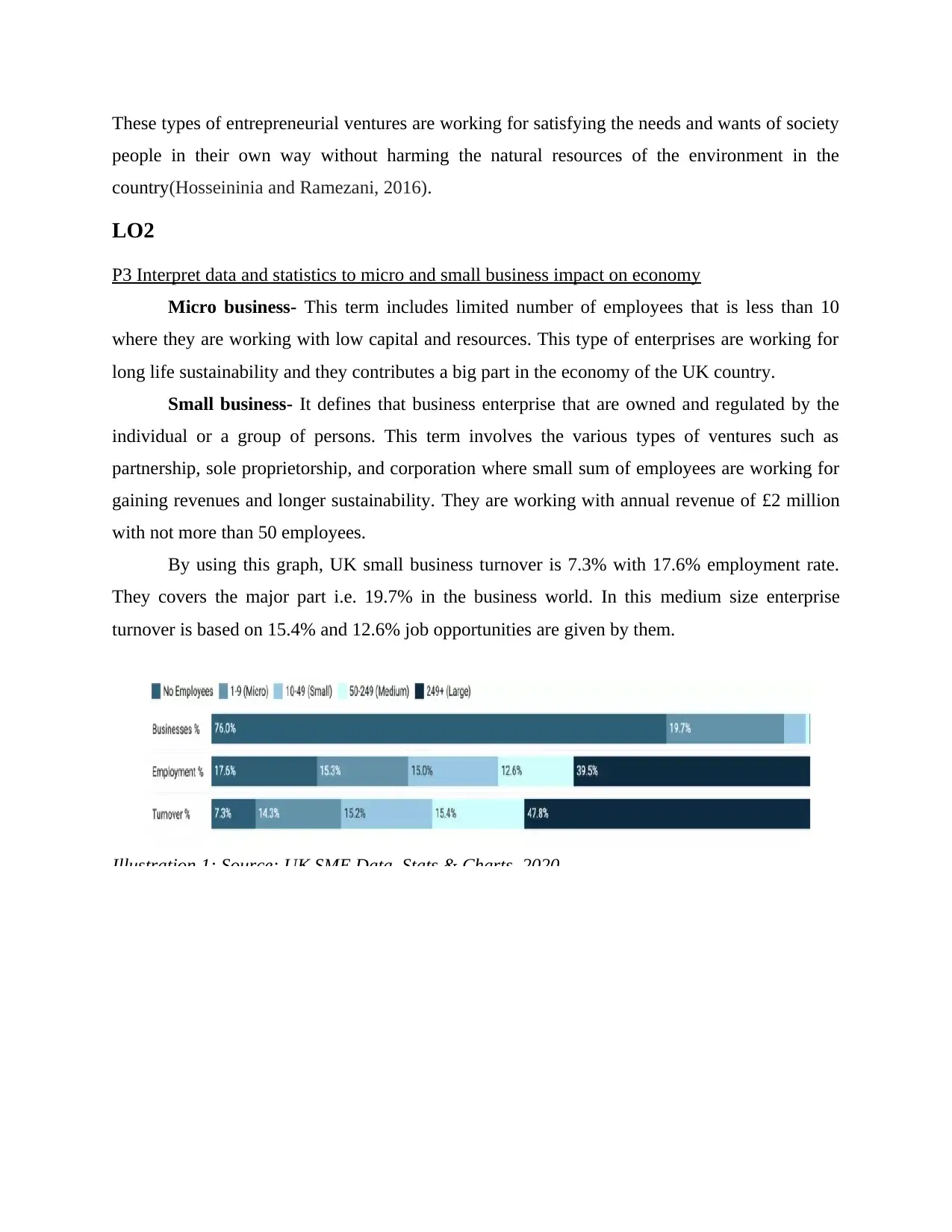
These types of entrepreneurial ventures are working for satisfying the needs and wants of society
people in their own way without harming the natural resources of the environment in the
country(Hosseininia and Ramezani, 2016).
LO2
P3 Interpret data and statistics to micro and small business impact on economy
Micro business- This term includes limited number of employees that is less than 10
where they are working with low capital and resources. This type of enterprises are working for
long life sustainability and they contributes a big part in the economy of the UK country.
Small business- It defines that business enterprise that are owned and regulated by the
individual or a group of persons. This term involves the various types of ventures such as
partnership, sole proprietorship, and corporation where small sum of employees are working for
gaining revenues and longer sustainability. They are working with annual revenue of £2 million
with not more than 50 employees.
By using this graph, UK small business turnover is 7.3% with 17.6% employment rate.
They covers the major part i.e. 19.7% in the business world. In this medium size enterprise
turnover is based on 15.4% and 12.6% job opportunities are given by them.
Illustration 1: Source: UK SME Data, Stats & Charts, 2020
people in their own way without harming the natural resources of the environment in the
country(Hosseininia and Ramezani, 2016).
LO2
P3 Interpret data and statistics to micro and small business impact on economy
Micro business- This term includes limited number of employees that is less than 10
where they are working with low capital and resources. This type of enterprises are working for
long life sustainability and they contributes a big part in the economy of the UK country.
Small business- It defines that business enterprise that are owned and regulated by the
individual or a group of persons. This term involves the various types of ventures such as
partnership, sole proprietorship, and corporation where small sum of employees are working for
gaining revenues and longer sustainability. They are working with annual revenue of £2 million
with not more than 50 employees.
By using this graph, UK small business turnover is 7.3% with 17.6% employment rate.
They covers the major part i.e. 19.7% in the business world. In this medium size enterprise
turnover is based on 15.4% and 12.6% job opportunities are given by them.
Illustration 1: Source: UK SME Data, Stats & Charts, 2020
Paraphrase This Document
Need a fresh take? Get an instant paraphrase of this document with our AI Paraphraser
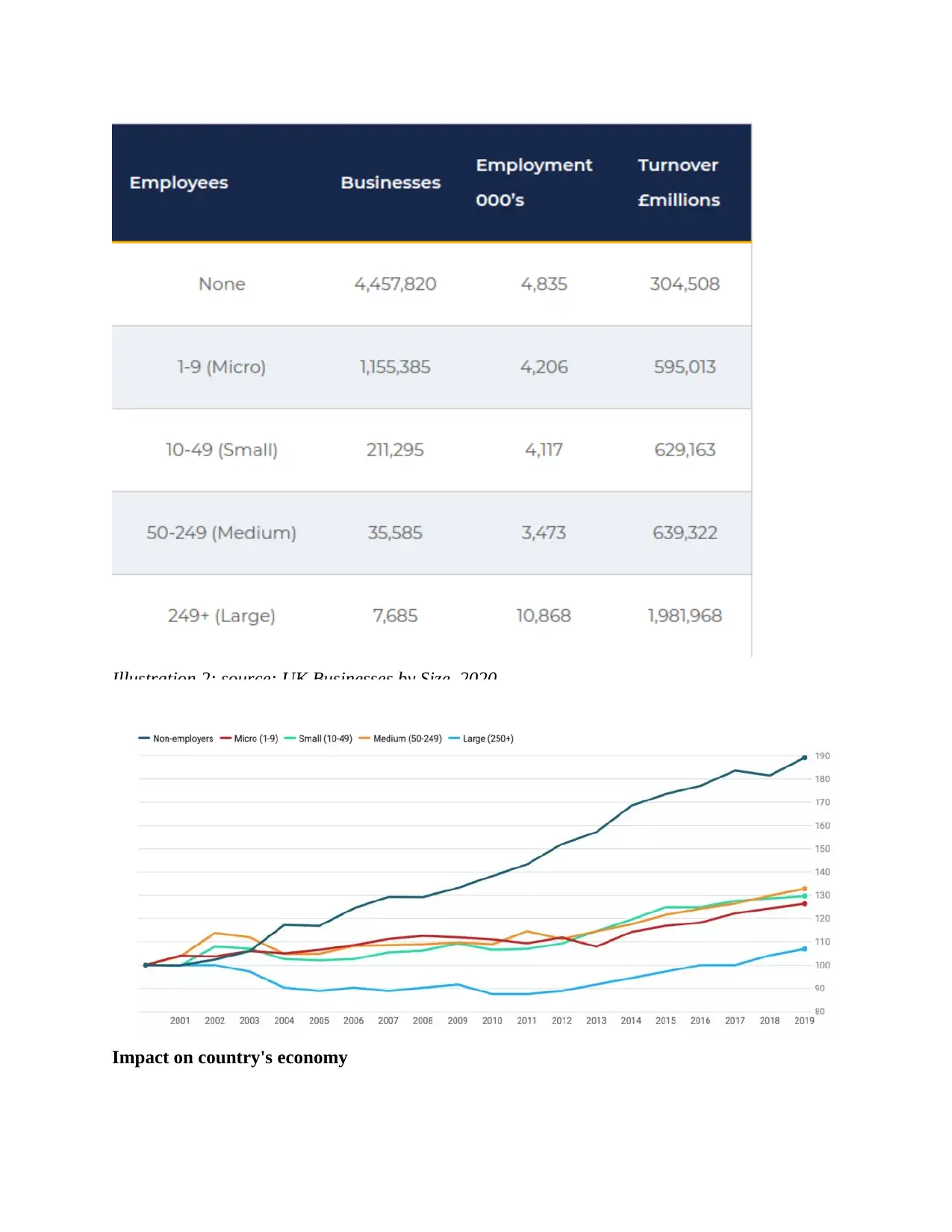
Illustration 2: source: UK Businesses by Size, 2020
Impact on country's economy
Impact on country's economy
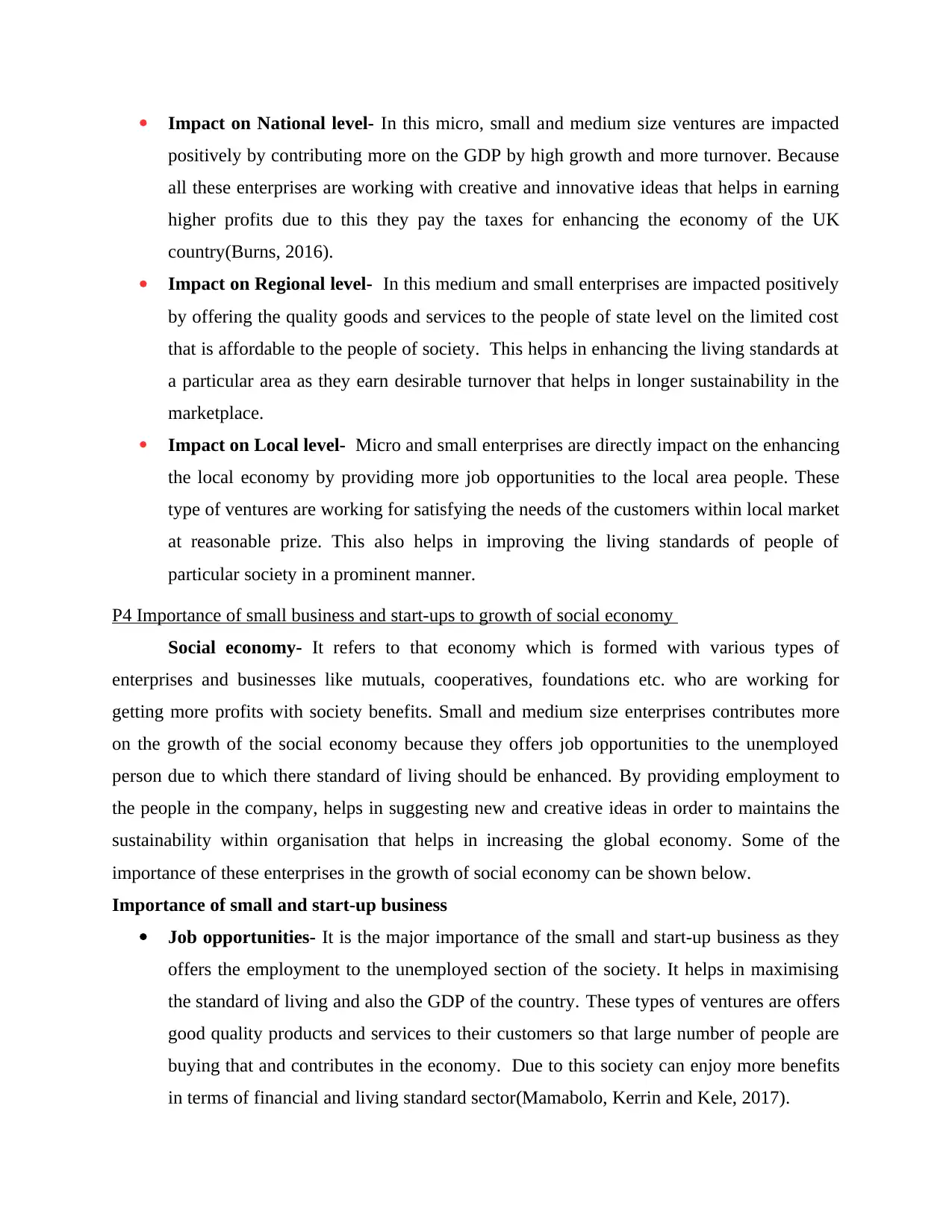
Impact on National level- In this micro, small and medium size ventures are impacted
positively by contributing more on the GDP by high growth and more turnover. Because
all these enterprises are working with creative and innovative ideas that helps in earning
higher profits due to this they pay the taxes for enhancing the economy of the UK
country(Burns, 2016).
Impact on Regional level- In this medium and small enterprises are impacted positively
by offering the quality goods and services to the people of state level on the limited cost
that is affordable to the people of society. This helps in enhancing the living standards at
a particular area as they earn desirable turnover that helps in longer sustainability in the
marketplace.
Impact on Local level- Micro and small enterprises are directly impact on the enhancing
the local economy by providing more job opportunities to the local area people. These
type of ventures are working for satisfying the needs of the customers within local market
at reasonable prize. This also helps in improving the living standards of people of
particular society in a prominent manner.
P4 Importance of small business and start-ups to growth of social economy
Social economy- It refers to that economy which is formed with various types of
enterprises and businesses like mutuals, cooperatives, foundations etc. who are working for
getting more profits with society benefits. Small and medium size enterprises contributes more
on the growth of the social economy because they offers job opportunities to the unemployed
person due to which there standard of living should be enhanced. By providing employment to
the people in the company, helps in suggesting new and creative ideas in order to maintains the
sustainability within organisation that helps in increasing the global economy. Some of the
importance of these enterprises in the growth of social economy can be shown below.
Importance of small and start-up business
Job opportunities- It is the major importance of the small and start-up business as they
offers the employment to the unemployed section of the society. It helps in maximising
the standard of living and also the GDP of the country. These types of ventures are offers
good quality products and services to their customers so that large number of people are
buying that and contributes in the economy. Due to this society can enjoy more benefits
in terms of financial and living standard sector(Mamabolo, Kerrin and Kele, 2017).
positively by contributing more on the GDP by high growth and more turnover. Because
all these enterprises are working with creative and innovative ideas that helps in earning
higher profits due to this they pay the taxes for enhancing the economy of the UK
country(Burns, 2016).
Impact on Regional level- In this medium and small enterprises are impacted positively
by offering the quality goods and services to the people of state level on the limited cost
that is affordable to the people of society. This helps in enhancing the living standards at
a particular area as they earn desirable turnover that helps in longer sustainability in the
marketplace.
Impact on Local level- Micro and small enterprises are directly impact on the enhancing
the local economy by providing more job opportunities to the local area people. These
type of ventures are working for satisfying the needs of the customers within local market
at reasonable prize. This also helps in improving the living standards of people of
particular society in a prominent manner.
P4 Importance of small business and start-ups to growth of social economy
Social economy- It refers to that economy which is formed with various types of
enterprises and businesses like mutuals, cooperatives, foundations etc. who are working for
getting more profits with society benefits. Small and medium size enterprises contributes more
on the growth of the social economy because they offers job opportunities to the unemployed
person due to which there standard of living should be enhanced. By providing employment to
the people in the company, helps in suggesting new and creative ideas in order to maintains the
sustainability within organisation that helps in increasing the global economy. Some of the
importance of these enterprises in the growth of social economy can be shown below.
Importance of small and start-up business
Job opportunities- It is the major importance of the small and start-up business as they
offers the employment to the unemployed section of the society. It helps in maximising
the standard of living and also the GDP of the country. These types of ventures are offers
good quality products and services to their customers so that large number of people are
buying that and contributes in the economy. Due to this society can enjoy more benefits
in terms of financial and living standard sector(Mamabolo, Kerrin and Kele, 2017).
⊘ This is a preview!⊘
Do you want full access?
Subscribe today to unlock all pages.

Trusted by 1+ million students worldwide
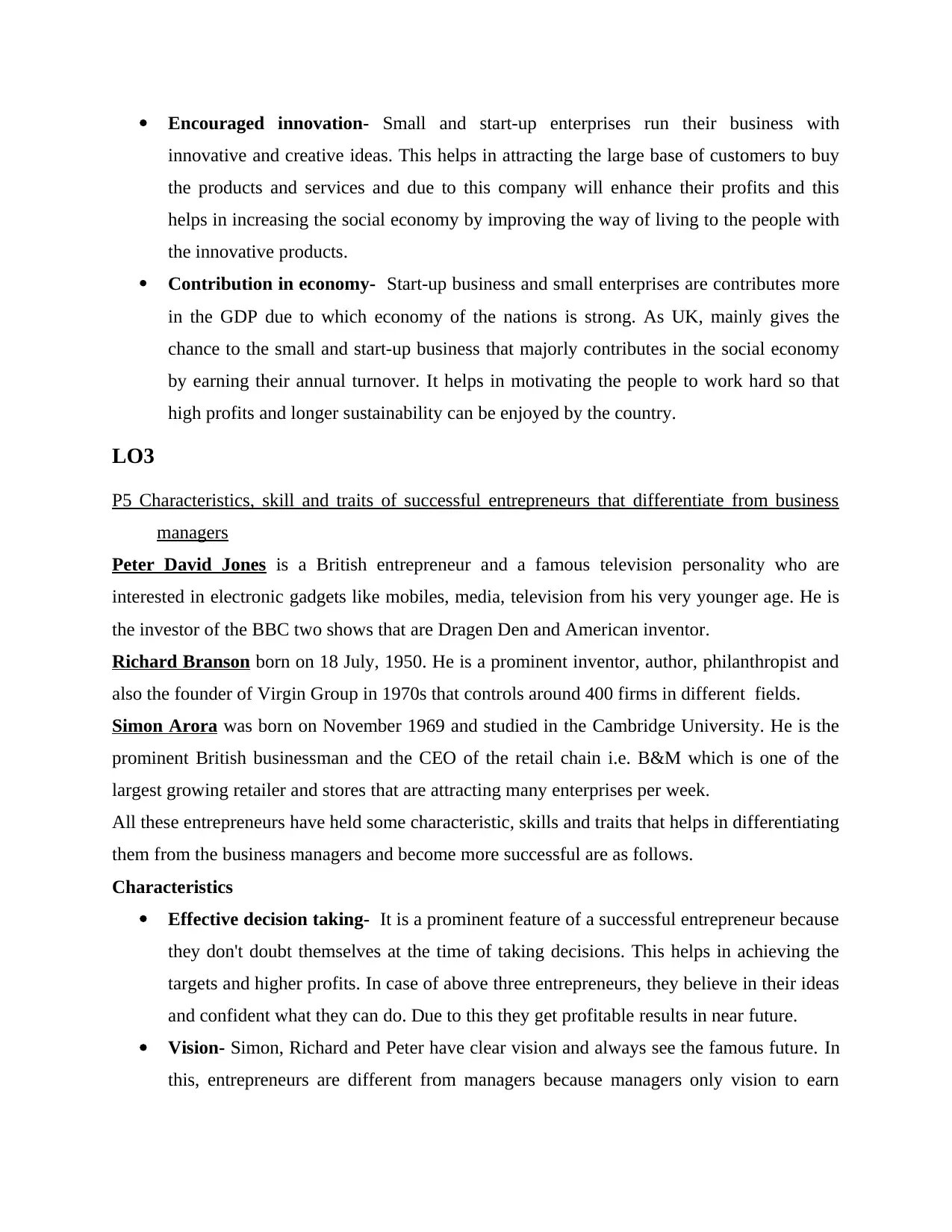
Encouraged innovation- Small and start-up enterprises run their business with
innovative and creative ideas. This helps in attracting the large base of customers to buy
the products and services and due to this company will enhance their profits and this
helps in increasing the social economy by improving the way of living to the people with
the innovative products.
Contribution in economy- Start-up business and small enterprises are contributes more
in the GDP due to which economy of the nations is strong. As UK, mainly gives the
chance to the small and start-up business that majorly contributes in the social economy
by earning their annual turnover. It helps in motivating the people to work hard so that
high profits and longer sustainability can be enjoyed by the country.
LO3
P5 Characteristics, skill and traits of successful entrepreneurs that differentiate from business
managers
Peter David Jones is a British entrepreneur and a famous television personality who are
interested in electronic gadgets like mobiles, media, television from his very younger age. He is
the investor of the BBC two shows that are Dragen Den and American inventor.
Richard Branson born on 18 July, 1950. He is a prominent inventor, author, philanthropist and
also the founder of Virgin Group in 1970s that controls around 400 firms in different fields.
Simon Arora was born on November 1969 and studied in the Cambridge University. He is the
prominent British businessman and the CEO of the retail chain i.e. B&M which is one of the
largest growing retailer and stores that are attracting many enterprises per week.
All these entrepreneurs have held some characteristic, skills and traits that helps in differentiating
them from the business managers and become more successful are as follows.
Characteristics
Effective decision taking- It is a prominent feature of a successful entrepreneur because
they don't doubt themselves at the time of taking decisions. This helps in achieving the
targets and higher profits. In case of above three entrepreneurs, they believe in their ideas
and confident what they can do. Due to this they get profitable results in near future.
Vision- Simon, Richard and Peter have clear vision and always see the famous future. In
this, entrepreneurs are different from managers because managers only vision to earn
innovative and creative ideas. This helps in attracting the large base of customers to buy
the products and services and due to this company will enhance their profits and this
helps in increasing the social economy by improving the way of living to the people with
the innovative products.
Contribution in economy- Start-up business and small enterprises are contributes more
in the GDP due to which economy of the nations is strong. As UK, mainly gives the
chance to the small and start-up business that majorly contributes in the social economy
by earning their annual turnover. It helps in motivating the people to work hard so that
high profits and longer sustainability can be enjoyed by the country.
LO3
P5 Characteristics, skill and traits of successful entrepreneurs that differentiate from business
managers
Peter David Jones is a British entrepreneur and a famous television personality who are
interested in electronic gadgets like mobiles, media, television from his very younger age. He is
the investor of the BBC two shows that are Dragen Den and American inventor.
Richard Branson born on 18 July, 1950. He is a prominent inventor, author, philanthropist and
also the founder of Virgin Group in 1970s that controls around 400 firms in different fields.
Simon Arora was born on November 1969 and studied in the Cambridge University. He is the
prominent British businessman and the CEO of the retail chain i.e. B&M which is one of the
largest growing retailer and stores that are attracting many enterprises per week.
All these entrepreneurs have held some characteristic, skills and traits that helps in differentiating
them from the business managers and become more successful are as follows.
Characteristics
Effective decision taking- It is a prominent feature of a successful entrepreneur because
they don't doubt themselves at the time of taking decisions. This helps in achieving the
targets and higher profits. In case of above three entrepreneurs, they believe in their ideas
and confident what they can do. Due to this they get profitable results in near future.
Vision- Simon, Richard and Peter have clear vision and always see the famous future. In
this, entrepreneurs are different from managers because managers only vision to earn
Paraphrase This Document
Need a fresh take? Get an instant paraphrase of this document with our AI Paraphraser
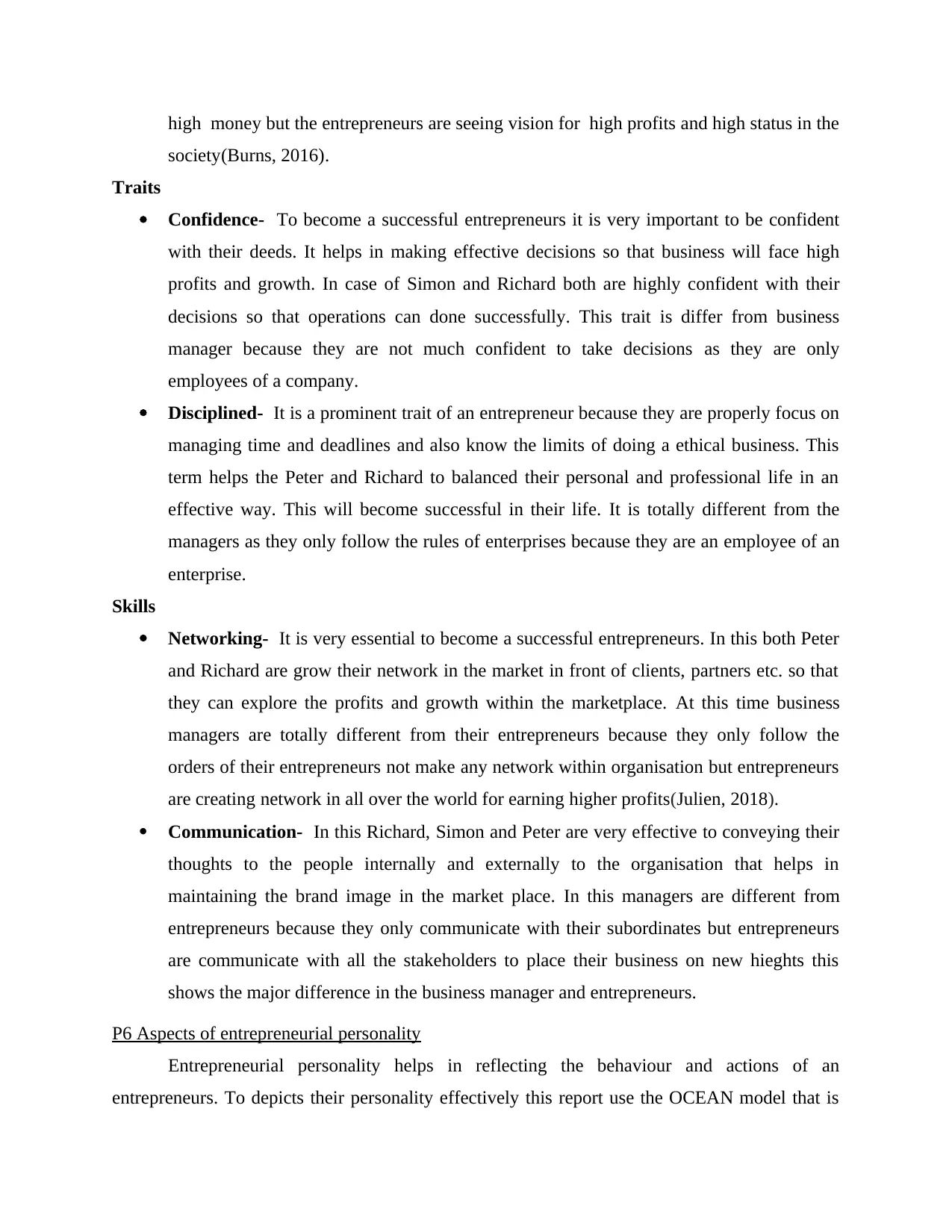
high money but the entrepreneurs are seeing vision for high profits and high status in the
society(Burns, 2016).
Traits
Confidence- To become a successful entrepreneurs it is very important to be confident
with their deeds. It helps in making effective decisions so that business will face high
profits and growth. In case of Simon and Richard both are highly confident with their
decisions so that operations can done successfully. This trait is differ from business
manager because they are not much confident to take decisions as they are only
employees of a company.
Disciplined- It is a prominent trait of an entrepreneur because they are properly focus on
managing time and deadlines and also know the limits of doing a ethical business. This
term helps the Peter and Richard to balanced their personal and professional life in an
effective way. This will become successful in their life. It is totally different from the
managers as they only follow the rules of enterprises because they are an employee of an
enterprise.
Skills
Networking- It is very essential to become a successful entrepreneurs. In this both Peter
and Richard are grow their network in the market in front of clients, partners etc. so that
they can explore the profits and growth within the marketplace. At this time business
managers are totally different from their entrepreneurs because they only follow the
orders of their entrepreneurs not make any network within organisation but entrepreneurs
are creating network in all over the world for earning higher profits(Julien, 2018).
Communication- In this Richard, Simon and Peter are very effective to conveying their
thoughts to the people internally and externally to the organisation that helps in
maintaining the brand image in the market place. In this managers are different from
entrepreneurs because they only communicate with their subordinates but entrepreneurs
are communicate with all the stakeholders to place their business on new hieghts this
shows the major difference in the business manager and entrepreneurs.
P6 Aspects of entrepreneurial personality
Entrepreneurial personality helps in reflecting the behaviour and actions of an
entrepreneurs. To depicts their personality effectively this report use the OCEAN model that is
society(Burns, 2016).
Traits
Confidence- To become a successful entrepreneurs it is very important to be confident
with their deeds. It helps in making effective decisions so that business will face high
profits and growth. In case of Simon and Richard both are highly confident with their
decisions so that operations can done successfully. This trait is differ from business
manager because they are not much confident to take decisions as they are only
employees of a company.
Disciplined- It is a prominent trait of an entrepreneur because they are properly focus on
managing time and deadlines and also know the limits of doing a ethical business. This
term helps the Peter and Richard to balanced their personal and professional life in an
effective way. This will become successful in their life. It is totally different from the
managers as they only follow the rules of enterprises because they are an employee of an
enterprise.
Skills
Networking- It is very essential to become a successful entrepreneurs. In this both Peter
and Richard are grow their network in the market in front of clients, partners etc. so that
they can explore the profits and growth within the marketplace. At this time business
managers are totally different from their entrepreneurs because they only follow the
orders of their entrepreneurs not make any network within organisation but entrepreneurs
are creating network in all over the world for earning higher profits(Julien, 2018).
Communication- In this Richard, Simon and Peter are very effective to conveying their
thoughts to the people internally and externally to the organisation that helps in
maintaining the brand image in the market place. In this managers are different from
entrepreneurs because they only communicate with their subordinates but entrepreneurs
are communicate with all the stakeholders to place their business on new hieghts this
shows the major difference in the business manager and entrepreneurs.
P6 Aspects of entrepreneurial personality
Entrepreneurial personality helps in reflecting the behaviour and actions of an
entrepreneurs. To depicts their personality effectively this report use the OCEAN model that is
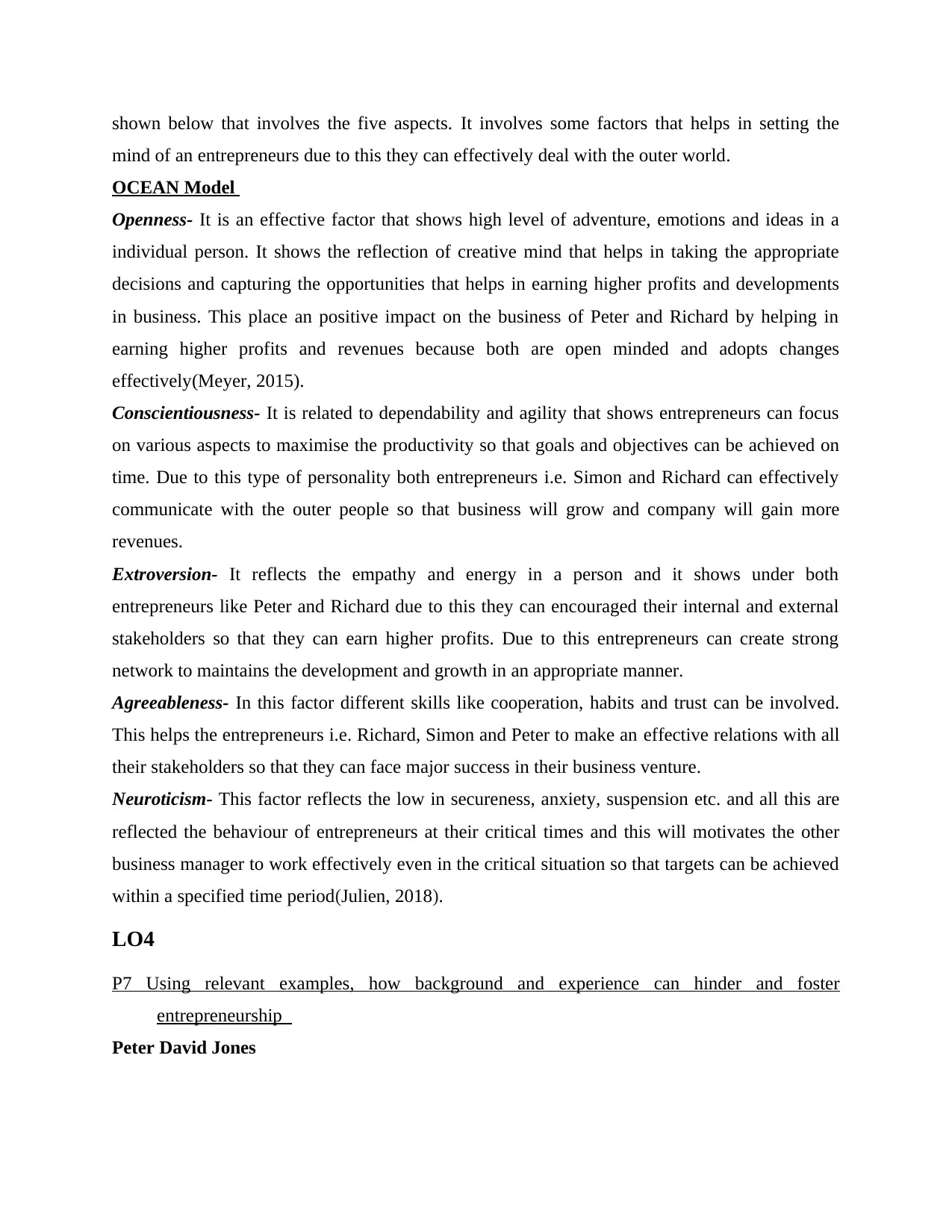
shown below that involves the five aspects. It involves some factors that helps in setting the
mind of an entrepreneurs due to this they can effectively deal with the outer world.
OCEAN Model
Openness- It is an effective factor that shows high level of adventure, emotions and ideas in a
individual person. It shows the reflection of creative mind that helps in taking the appropriate
decisions and capturing the opportunities that helps in earning higher profits and developments
in business. This place an positive impact on the business of Peter and Richard by helping in
earning higher profits and revenues because both are open minded and adopts changes
effectively(Meyer, 2015).
Conscientiousness- It is related to dependability and agility that shows entrepreneurs can focus
on various aspects to maximise the productivity so that goals and objectives can be achieved on
time. Due to this type of personality both entrepreneurs i.e. Simon and Richard can effectively
communicate with the outer people so that business will grow and company will gain more
revenues.
Extroversion- It reflects the empathy and energy in a person and it shows under both
entrepreneurs like Peter and Richard due to this they can encouraged their internal and external
stakeholders so that they can earn higher profits. Due to this entrepreneurs can create strong
network to maintains the development and growth in an appropriate manner.
Agreeableness- In this factor different skills like cooperation, habits and trust can be involved.
This helps the entrepreneurs i.e. Richard, Simon and Peter to make an effective relations with all
their stakeholders so that they can face major success in their business venture.
Neuroticism- This factor reflects the low in secureness, anxiety, suspension etc. and all this are
reflected the behaviour of entrepreneurs at their critical times and this will motivates the other
business manager to work effectively even in the critical situation so that targets can be achieved
within a specified time period(Julien, 2018).
LO4
P7 Using relevant examples, how background and experience can hinder and foster
entrepreneurship
Peter David Jones
mind of an entrepreneurs due to this they can effectively deal with the outer world.
OCEAN Model
Openness- It is an effective factor that shows high level of adventure, emotions and ideas in a
individual person. It shows the reflection of creative mind that helps in taking the appropriate
decisions and capturing the opportunities that helps in earning higher profits and developments
in business. This place an positive impact on the business of Peter and Richard by helping in
earning higher profits and revenues because both are open minded and adopts changes
effectively(Meyer, 2015).
Conscientiousness- It is related to dependability and agility that shows entrepreneurs can focus
on various aspects to maximise the productivity so that goals and objectives can be achieved on
time. Due to this type of personality both entrepreneurs i.e. Simon and Richard can effectively
communicate with the outer people so that business will grow and company will gain more
revenues.
Extroversion- It reflects the empathy and energy in a person and it shows under both
entrepreneurs like Peter and Richard due to this they can encouraged their internal and external
stakeholders so that they can earn higher profits. Due to this entrepreneurs can create strong
network to maintains the development and growth in an appropriate manner.
Agreeableness- In this factor different skills like cooperation, habits and trust can be involved.
This helps the entrepreneurs i.e. Richard, Simon and Peter to make an effective relations with all
their stakeholders so that they can face major success in their business venture.
Neuroticism- This factor reflects the low in secureness, anxiety, suspension etc. and all this are
reflected the behaviour of entrepreneurs at their critical times and this will motivates the other
business manager to work effectively even in the critical situation so that targets can be achieved
within a specified time period(Julien, 2018).
LO4
P7 Using relevant examples, how background and experience can hinder and foster
entrepreneurship
Peter David Jones
⊘ This is a preview!⊘
Do you want full access?
Subscribe today to unlock all pages.

Trusted by 1+ million students worldwide
1 out of 15
Related Documents
Your All-in-One AI-Powered Toolkit for Academic Success.
+13062052269
info@desklib.com
Available 24*7 on WhatsApp / Email
![[object Object]](/_next/static/media/star-bottom.7253800d.svg)
Unlock your academic potential
Copyright © 2020–2026 A2Z Services. All Rights Reserved. Developed and managed by ZUCOL.





